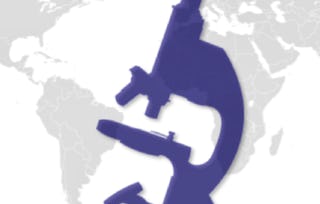Current and future public health is characterized by the increase of chronic and degenerative diseases, corresponding to the worldwide ageing of the population. The increasing prevalence of these conditions together with the long incubation period of the chronic diseases and the continual technological innovations, offer new opportunities to develop strategies for early diagnosis.


Disease Screening in Public Health


Disease Screening in Public Health



Instructors: Antoine Flahault
27,434 already enrolled
Included with
406 reviews
Skills you'll gain
Details to know

Add to your LinkedIn profile
8 assignments
See how employees at top companies are mastering in-demand skills

There are 8 modules in this course
This module will provide a brief welcome by Dr. Fred Paccaud and Dr. Antoine Flahault. An overview of screening and an introduction on how the course is organized and evaluated will be provided by Dr. Gillian Bartlett-Esquilant. Dr. Idris Guessous, a Senior Lecturer in the Population Epidemiology Unit in the Department of Community Medicine, Primary Care and Emergency Medicine (Geneva), and in the Department of Ambulatory Care and Community Medicine (PMU Lausanne) & Division of Chronic Diseases at the Institute of Social and Preventive Medicine (Lausanne) will provide lectures on definitions of screening. Natural history of diseases and the characteristics of subclinical conditions allowing early diagnosis will be presented. A quiz on the key concepts for screening will complete this module.
What's included
9 videos9 readings1 assignment
The second module, provided by Dr. Idris Guessous, will address the metrics of screening with concepts related to robustness, validity and impact. A quiz on screening metrics will complete this module.
What's included
10 videos2 readings1 assignment
This module on screening in the prenatal (pregnancy) and perinatal (newborn) stage of life is given by Professor Murielle Bochud, MD, PhD, head of the Institute of social and preventive medicine in Lausanne, Switzerland. A quiz will complete this module.
What's included
6 videos3 readings1 assignment
Senior lecturer Arnaud Chiolero, MD, PhD, from the Division of Chronic Diseases at the Institute of Social and Preventive Medicine in Lausanne will be presenting three case studies related to the increasingly prevalent condition of cardiometabolic disease. Three different diseases will be explored in terms of burden of disease, benefits and harms, evidence and issues followed by recommendations about whether screening should be implemented. A quiz will complete this module.
What's included
4 videos2 readings1 assignment
Cancer is a classical field for screening because of both the improvement of the prognosis for most cancers and the usually long incubation period. This part of the MOOC will present current data, evidence and policies regarding the most important cancer sites that include colorectum, prostate, lung, cervix, breast and skin. This module is given by several experts including Elisabetta Rapiti from the Geneva Cancer Registry at the Institute of Global Health in Geneva; Professor Antoine Flahault, who is the Head of the Institute of Global Health in Geneva; and Jean-Luc Buillard who is a Senior Lecturer in the Division of Chronic Diseases at the Institute for Social and Preventive Medicine in Lausanne. A quiz will complete this module.
What's included
8 videos2 readings1 assignment
This module explores the topics of public mental health and screening in the ageing population for neuropsychiatric conditions and physical impairments such as hearing loss. This module is given by several experts including Emiliano Albanese, assistant professor in public mental health in the Department of Psychiatry at the University of Geneva and the Director of the WHO Collaborating Center for Research and Training in mental health at the University of Geneva; Professor Christophe Bula who is the head of the geriatric and geriatric rehabilitation service at the Vaudois University Hospital Centre; Professor Armin von Gunten who is the head of the university service for geriatric psychiatry at the Vaudois University Hospital Service. A quiz will complete this module.
What's included
6 videos2 readings1 assignment
The globalization of non-communicable diseases is a major challenge in low and middle income countries (LMIC). At the same time, migration is occurring between these countries and high income countries. Screening for cardiovascular diseases and for cancer in low and middle income countries will be presented and discussed. In addition, the special consideration of screening of migrants from these countries will be addressed. This module is given by: Professor Pascal Bovet from the Division of Chronic Diseases at the Institute of Social and Preventive Medicine in Lausanne; Dr. Catherine Sauvaget from the International Agency for Research on Cancer (IARC) in Lyon, France; and Professor Patrick Bodenmann from the Polimedical University Clinic and head of the Centre for Vulnerable Populations. A quiz will complete this module.
What's included
8 videos3 readings1 assignment
In this final module, important aspects of for the evaluation, planning and decision making about the implementation or stopping of screening programs will be presented. This material is given by Senior lecturer Jean-Luc Bulliard who is an epidemiologist in the Division of Chronic Diseases at the Institute for Social and Preventive Medicine in Lausanne. The conclusion of the module will be a series of interviews with experts on the future of disease screening in public health conducted by Dr. Gillian Bartlett-Esquilant, a visiting professor at the Institute for Social and Preventive Medicine at Lausanne. A quiz will close this module.
What's included
9 videos2 readings1 assignment
Instructors



Explore more from Public Health
 Status: Free Trial
Status: Free TrialJohns Hopkins University
 Status: Free Trial
Status: Free TrialUniversity of Lausanne
 Status: Free Trial
Status: Free TrialImperial College London
 Status: Free Trial
Status: Free TrialJohns Hopkins University
Why people choose Coursera for their career

Felipe M.

Jennifer J.

Larry W.

Chaitanya A.
Learner reviews
- 5 stars
69.70%
- 4 stars
21.67%
- 3 stars
5.17%
- 2 stars
1.47%
- 1 star
1.97%
Showing 3 of 406
Reviewed on Jun 1, 2020
This is one of the best online course l have experienced in recent times thanks to all those who put this up.
Reviewed on Sep 6, 2020
The lest I can say, it's fantastic and very well prepared, organised and conducted. Thank you very much.
Reviewed on Jun 22, 2021
It is a wonderful course and it help me to improve my skill, providing the very interesting methods in disease screening and implementation. How to evaluate a screening process is also learned.

Open new doors with Coursera Plus
Unlimited access to 10,000+ world-class courses, hands-on projects, and job-ready certificate programs - all included in your subscription
Advance your career with an online degree
Earn a degree from world-class universities - 100% online
Join over 3,400 global companies that choose Coursera for Business
Upskill your employees to excel in the digital economy
Frequently asked questions
To access the course materials, assignments and to earn a Certificate, you will need to purchase the Certificate experience when you enroll in a course. You can try a Free Trial instead, or apply for Financial Aid. The course may offer 'Full Course, No Certificate' instead. This option lets you see all course materials, submit required assessments, and get a final grade. This also means that you will not be able to purchase a Certificate experience.
When you purchase a Certificate you get access to all course materials, including graded assignments. Upon completing the course, your electronic Certificate will be added to your Accomplishments page - from there, you can print your Certificate or add it to your LinkedIn profile.
Yes. In select learning programs, you can apply for financial aid or a scholarship if you can’t afford the enrollment fee. If fin aid or scholarship is available for your learning program selection, you’ll find a link to apply on the description page.
More questions
Financial aid available,



